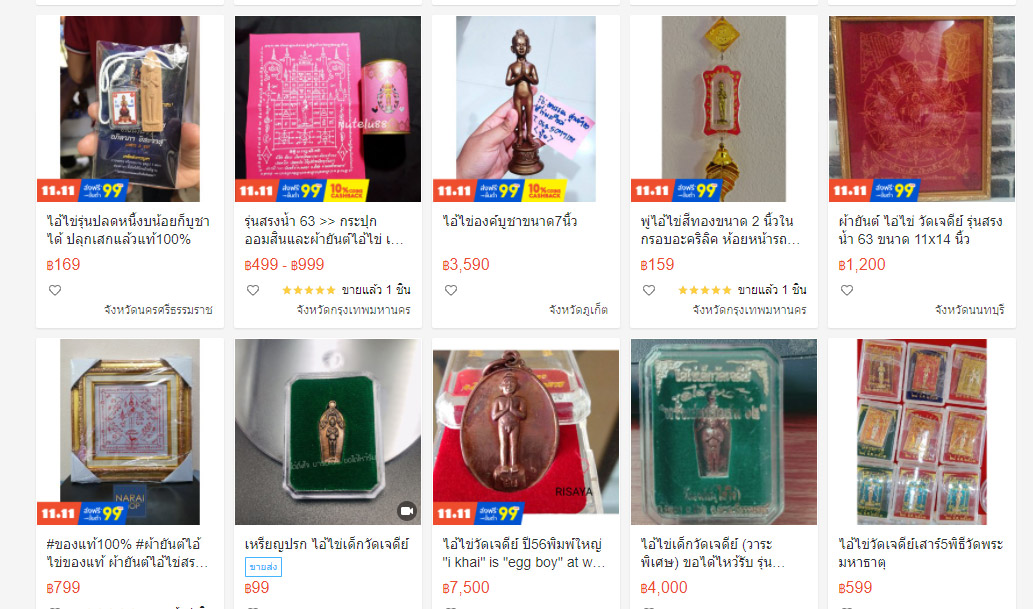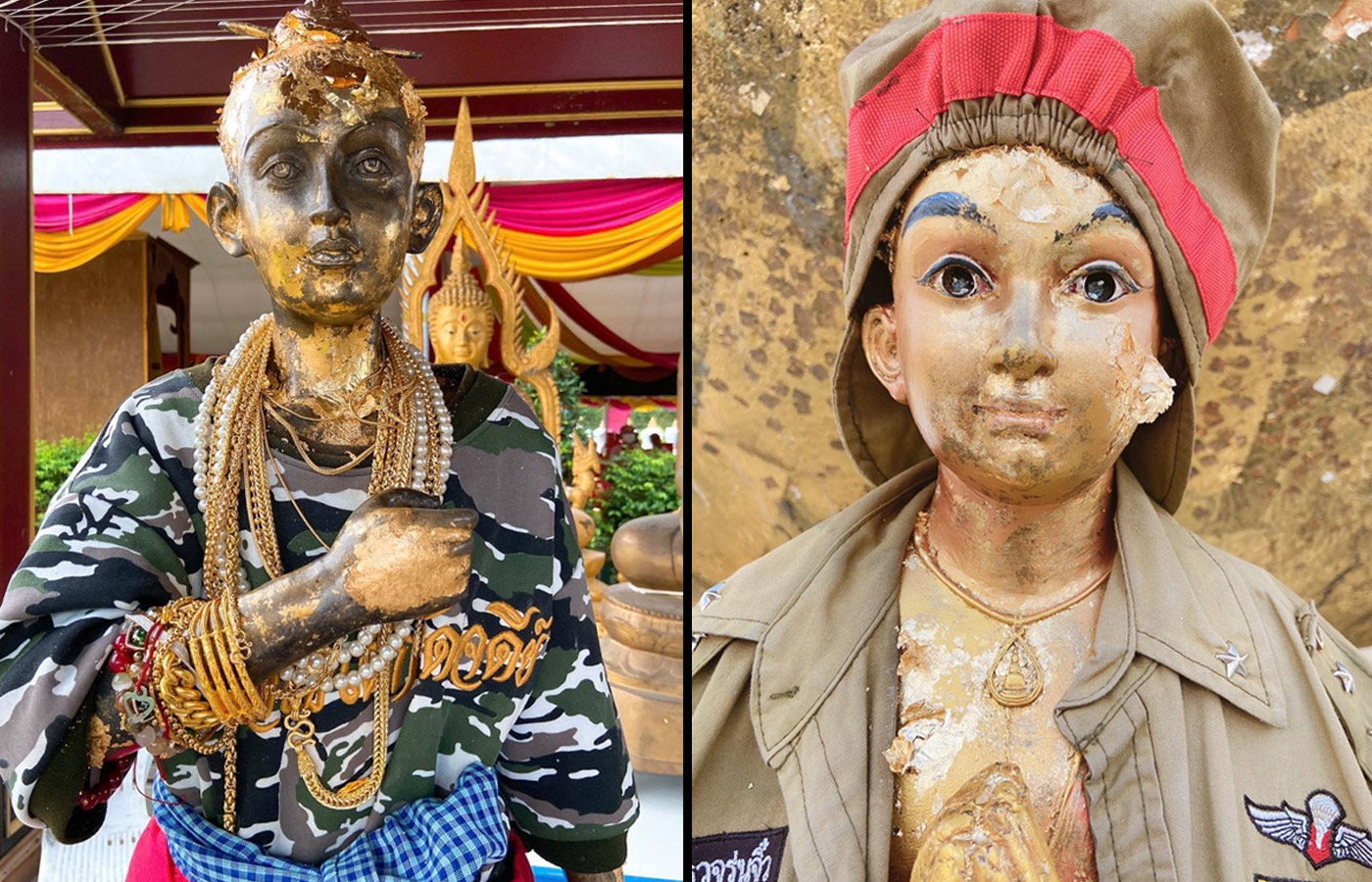In the 1980s when the Cold War still raged in the kingdom, a unit of paramilitary rangers was sent south to Nakhon Si Thammarat to crack down on the communist movement. Once there, they set up a temporary base camp inside an ancient temple.
All through their first night, the rangers were unable to sleep as they were vexed by a formless poltergeist. It pulled their arms and legs. Knocked their heads. Move their guns. By morning, their weapon racks were toppled, and they were convinced some very mischievous spirit was at play.
The next morning, locals heard about their miserable night and let them in on their secret: Their juvenile tormentor had a name, “Ai Khai,” a spirit they said had guarded the grounds for hundreds of years, since the late Ayutthaya period. They said it was occasionally spotted in the form of a boy, about 9, running naked around the temple.
The boy, Khai, was said to be a student and servant of a veteran monk who was heading north on a pilgrimage to Ayutthaya. Passing through Nakhon Si Thammarat, the pair stopped at a monastery. The monk, with his advanced sensitivity to the metaphysical, realized the monastery would become a significant Buddhist site, so he tasked the boy with a new purpose. “You shall stay here, for the graciousness and prosperity of this place in the future, a milestone for the religion,” he told him.
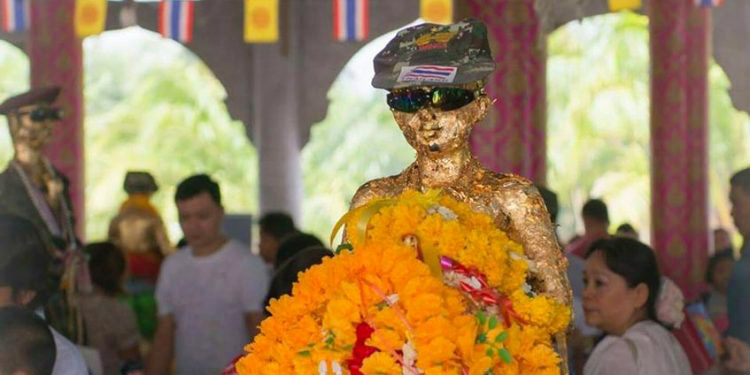
Obeying, the boy stayed and quickly became appreciated for his ability to solve the problems of anyone who asked, particularly with their cattle. So, despite his very naughty nature, he became beloved.
His end however came shortly after he learned the monk was returning from Ayutthaya. Afraid of leaving and abandoning his pledge, the boy walked into a temple pond and drowned himself. Yet to this day, his immortal spirit lingers, protecting and helping those who call upon him.
Today, the monastery is Wat Chedi Ai Khai. And the boy ghost is one of Thailand’s most famous spirits after his brand rose to national fame during the difficult recent months for the belief he can grant wishes – especially winning lottery numbers. With the pandemic spreading economic despair and ruin, thousands now arrive daily to Wat Chedi Ai Khai to call on its sacred spiritual protector for help, creating a massive industry fueled by belief – and delivering material benefits.
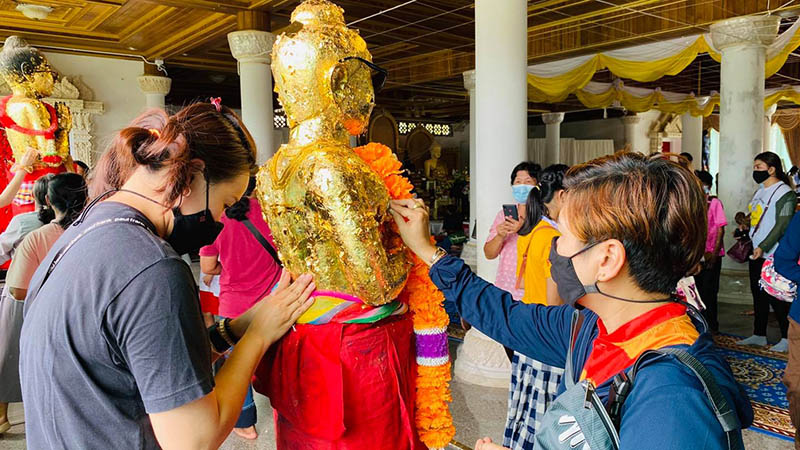
Ai Who?
There are other origin stories about the Kuman Thong-like spirit who’s been famous in the region for a long time. But those in Bangkok probably heard about Ai Khai only when he became a news sensation earlier this year when his blessings were credited with breathing life back into the pandemic-slumped economy of Nakhon Si Thammarat, which has been enjoying a boom of Ai Khai tourism.
Unlike those who travel from afar to wait in long lines in hope of getting an amulet bearing the spirit, Sukanya Yoowang said she acquired one by chance around five years ago, as if he wanted her to have it.
“Actually I didn’t use to pray to him. I have him because I suddenly found him. I’d lived here for decades. I didn’t know where it came from. It was just there on the ground, in front of our home,” the 53-year-old mackerel seller in the neighboring Surat Thani said of how she found the oval-shape amulet of Ai Khai.
“Whenever I go to the market, I call on him to help me. Everytime I ask him, I can sell out all the mackerel in no time,” she told Coconuts Bangkok. “My sister also found an amulet. Out of nowhere. It lay in front of her stall, as if he only appears to those he wants to help.”
Nipha Siridikij, another Surat Thani resident, said that while she doesn’t particularly believe in Ai Khai, she prayed and made offerings to him upon hearing about his power to grant wishes. That was around 10 years ago.
“When my kids were taking university admission tests, I asked him to help,” she said. “I asked him to help my son, and he got accepted.”
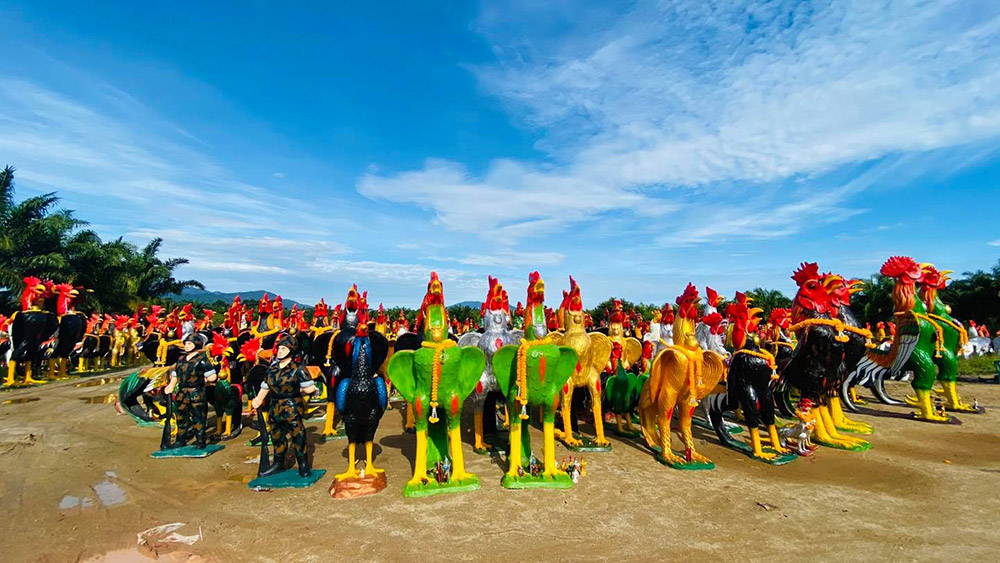
Debated Provenance
Walk around Wat Chedi and find several statues of a young boy covered in gold patches and wearing sunglasses, flower wreaths and camouflage military garb. Also, a portion of the temple’s grounds is strikingly packed with colorful rooster figures of all sizes. People also leave children toys, red sodas, slingshots, and light firecrackers for him.
Nipha however said she prayed to Ai Khai many years ago not at Wat Chedi but at Wat Sa Si Mum, another temple in the same district, where a monk told her about the “original” Ai Khai wooden statue and lore.
“Ai Khai was a naughty boy. He liked gambling, and loud noises.” she said. “In the past, people used to gamble in the temple. After finishing work there, they would grab roosters to fight. It was the traditional kind of gambling, how ordinary villagers in the past liked to play.”
Nipha said Ai Khai used to be revered for helping people find misplaced animals and belongings, before becoming a divine force of luck and wealth.
“When something happened, they’d call Ai Khai for help. When they felt unsafe, when there were thieves around, just asked and he’d help with anything. If they lost their cattles or chickens, they asked him and would find the animals. Now, people put faith in him over gambling or business.”
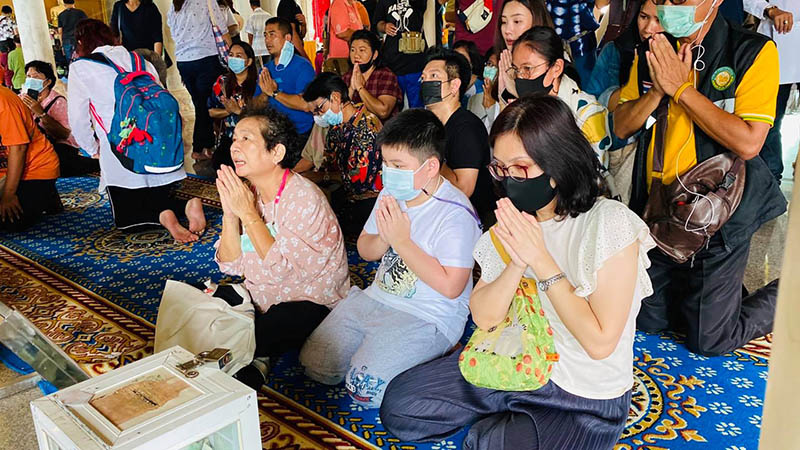
Playful ghost, big business
For a centuries-old ghost, Ai Khai surged to national attention in late May after a woman said she saw him running around her kitchen. She lit some firecrackers, saw the No. 22, and, cha-ching, won a lottery payout.
It came as anxiety was running high, with an intense government lockdown and worldwide travel ban in place due to COVID-19, which had knee-capped the kingdom’s tourism-driven economy.
Thailand had lost nearly 70% of tourism revenue, about THB1.39 trillion (US$44.6 billion), as of September compared to the same period last year. By August, more than 720,000 people had become unemployed, a nearly 90% increase from one year earlier.
So it was a boon to the southern province, buffeted by the economic turmoil, to suddenly be the go-to place for material salvation through spiritual appeals.
By mid-August the temple had sold out of amulets after tens of thousands flocked there to buy them. Earlier this month, it announced that it had raised over THB56 million (US$1.8 million) during Kathin, which amounts to an annual donor drive.
Visitors to the province have spiked, and last month Nakhon Si Thammarat became the only province to see more overnight visitors, a rise of nearly 2% from 2019.
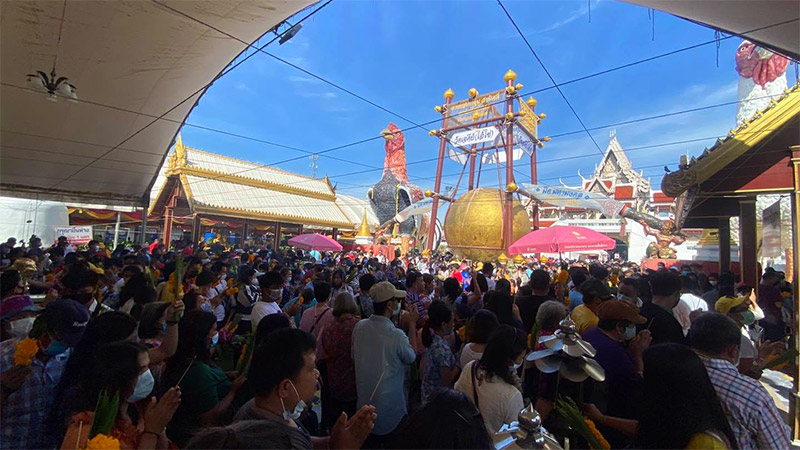
Power of Belief
Like many, Sukanya believes Ai Khai is behind her shop’s mad mackerel sales – not to mention her sister’s grilled pork business.
Still, there are always skeptics. Sukanya’s employer isn’t less convinced Egg Boy is driving sales and rather believes in her product.
“We’ve always done well. For several years, sales have been good. Our product is better than other shops,” said mackerel shop owner Ussanee Wichaidis. “In this business, we also have to work hard, not just pray to some spiritual beings.”
But that hasn’t stopped her from beseeching the impish sprite for some winning lottery numbers, not when everyone around her is a believer.
“I asked for the No. 1 jackpot. [In return, I vowed to] give away 300 packages of my mackerel,” she said. “Of course I didn’t win… Many of my friends go [to the temple], asking for stuff. It’s not like they win every time. Or if they win, it’s not a big one, more like 20,000 or 30,000 baht. I’ve never seen anyone get a large payout.”
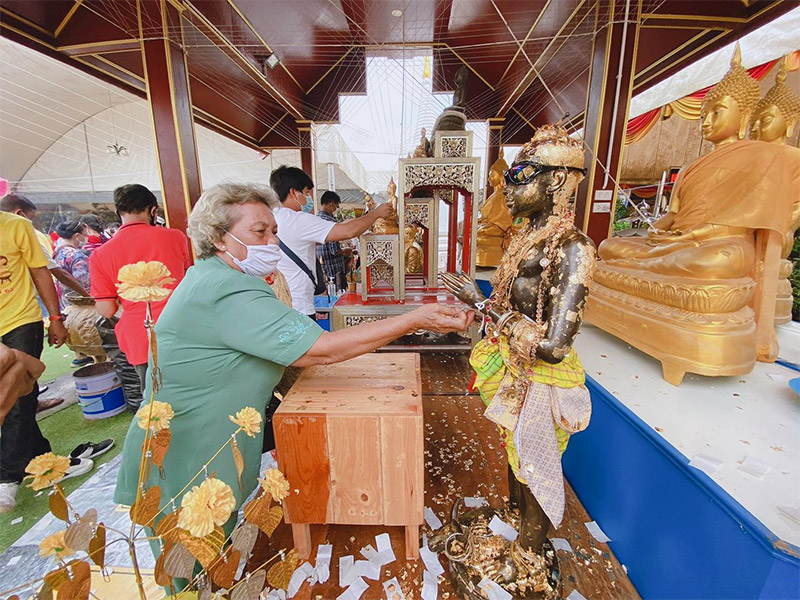
Whether the boy has the actual magic of blessing people with wealth or not, he surely does for the Nakhon Si Thammarat economy, especially for Wat Chedi.
Ai Khai’s explosive popularity has seen his likeness adopted by temples around the country, from Nakhon Pathom to Udon Thani and Chiang Mai. Online marketplaces such as Shopee and Lazada sell amulets, magic cloths and Ai Khai-themed spirit houses for thousands of baht.
Rank capitalism and consumer exploitation? For Nipha, who credits the boy ghost with getting her child into college, the spirit does the most good to those around the temple.
“Now there are a lot of tourists from Bangkok. The locals love it because of the money they bring here. When I visited in the past, there were just simple shelters. People laid out their goods for sale on the ground,” she said. “It was so different from these days, now that everything is thriving, so business-like, not like I used to remember.”
